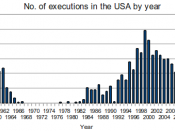Capital Punishment Capital punishment is defined as the imposition of the death penalty by the state. In 1972, the United States Supreme Court voided all federal and state laws calling for the death penalty on grounds that it was a violation of the 8th amendment to the U.S. Constitution, but in 1976 this ruling would change. In 1976 the Supreme Court abolished the ruling from 1972, holding that "the punishment of death does not invariably violate the Constitution."ÃÂ The Court ruled that the new death penalty statutes contained "objective standards to guide, regularize, and make rationally reviewable the process for imposing the sentence of death."ÃÂ(Gregg v. Georgia, 428 U.S. 153) There are now roughly thirty-eight state legislatures, and the Federal government that have enacted death penalty statutes patterned after those the Court upheld in Gregg. Executions resumed in 1977, and as of May 1997, over 3,200 men and women were under a death sentence with more than 360 already executed.
This country is determined to prove that killing someone under certain circumstances is acceptable, when in all reality there can be no rationalization for the taking of another human life. There have been so many different controversies surrounding this debate that often, the issues become clouded in false statistics and slewed arguments. The basic fact remains that killing is morally and ethically wrong. This fact does not disappear by simply changing the term "murder"ÃÂ to "capital punishment."ÃÂ The act is still taking of a life. Financial costs, wrongly accused felons and the myth that it will deter future crimes, are just a few reasons that we as a society must abolish capital punishment.
It is sometimes suggested that abolishing capital punishment is unfair to the taxpayer, on the assumption that life imprisonment is more expensive than execution. If one...


